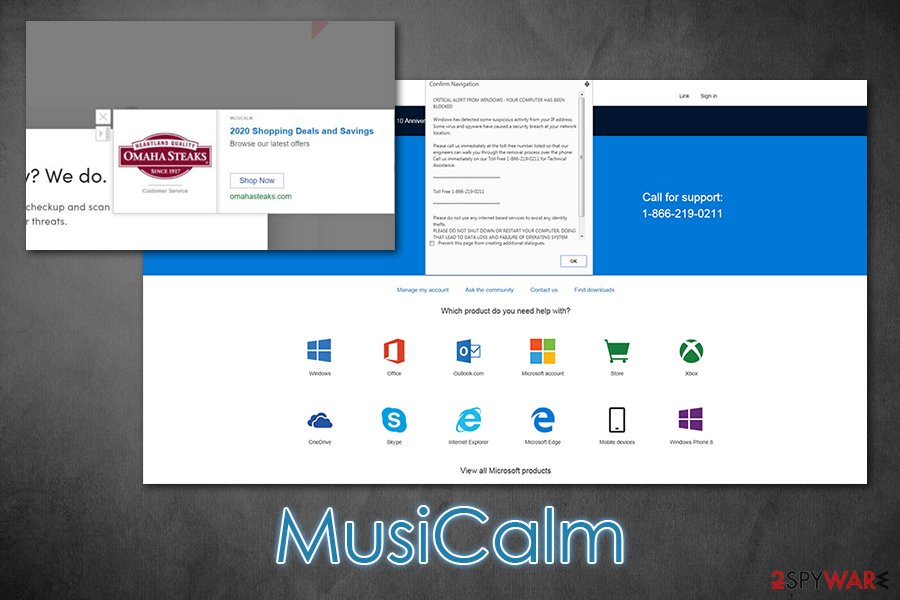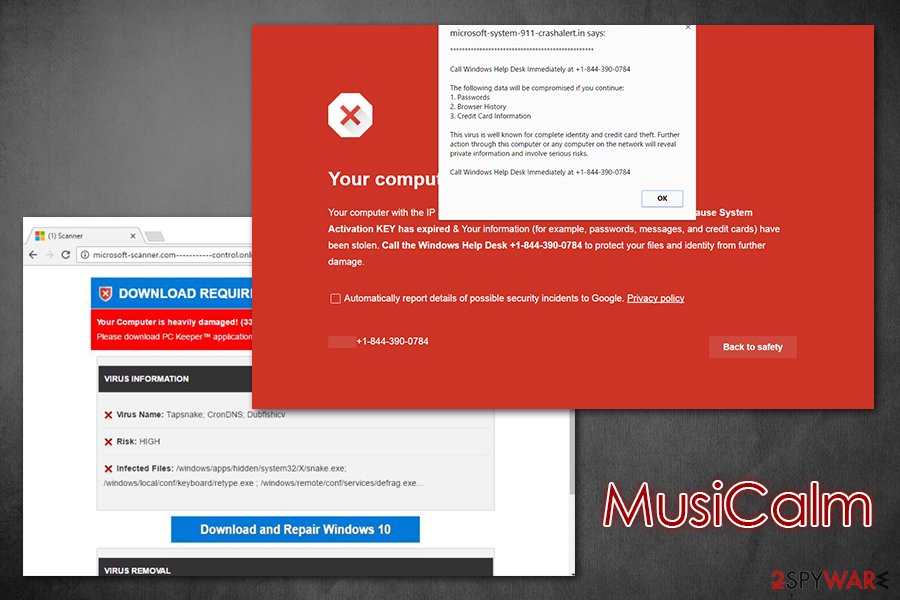MusiCalm – a music player that will flood your browsers with ads

MusiCalm is a potentially unwanted application that is typically downloaded along with freeware or software cracks

MusiCalm is a potentially unwanted application that is typically downloaded along with freeware or software cracks
MusiCalm is a potentially unwanted program that users typically download in a bundle from third-party sites. As a result, they do not notice the entry point, so many even aren’t aware that they have the program installed in the first place. What is depicted as a useful media player is actually an intrusive adware application that will display pop-ups, deals, offers, coupons, and another type of advertisement on Google Chrome, Mozilla Firefox, MS Edge, Safari, or another web browser.
Additionally, users might hind that their web browser settings, such as the new tab URL, homepage, and the search engine, were altered by the MusiCalm virus. Besides the intrusive commercial content, adware is also often used to track users’ web browsing activities and, in some cases, even record personal information like email for marketing purposes. If you want to get rid of MusiCalm ads, you have to uninstall the app from your system.
| Name | MusiCalm |
| Type | Adware, potentially unwanted program |
| Alleged functionality | Music player |
| Infiltration | Pirated software installers, software cracks, freeware bundles, fake updates, and other shady methods |
| Symptoms | Intrusive advertisements show up on all websites that you visit, web browser settings altered, unknown browser extensions or apps installed without permissions, redirects bring to insecure sites, etc. |
| Risks | Installation of other potentially unwanted programs or malware, loss of personal information, financial losses, identity theft |
| Executable names | SmoothVideo Project (SVP) Pro 4.3.0.182 Crack Registration Key [Latest].exe, MusiCalm.exe, Setup_Video_Codecs.exe |
| Removal | If you found the app on your system unexpectedly or you downloaded a software crack, you should immediately scan the machine with anti-malware software. Nonetheless, you can also eliminate the PUP manually in most cases – we provide full instructions below |
| System fix | Malware can sometimes damage system files, making the computer crash, lag, or suffer from other stability issues |
While most users download MusiCalm adware from legitimate third-party software distribution sites, some versions of the virus were also observed being spread via illegal cracking tool installers, such as SmoothVideo Project (SVP) Pro 4.3.0.182 Crack Registration Key [Latest].exe. Downloading software cracks is a huge security risk, and you should not engage in such activities in order to avoid the MusiCalm virus, as well as much more devastating computer infections such as ransomware or remote access trojan (RAT).[1]
Also, there are several reputable anti-malware programs that could prevent the infiltration of MusiCalm and other infections. One of the application samples is recognized as follows on Virus Total:[2]
- Win32:AdwareSig [Adw]
- Gen:Variant.MSILPerseus.213713
- Generic PUA NO (PUA)
- Trojan:MSIL/Skeeyah!MTB
- Trojan.Gen.MBT
- Artemis!PUP
- Trojan.Win32.Generic.pak!cobra
Judging by the definitions of anti-malware detection, some versions of the MusiCalm virus can be classified as Trojans. Such infections are particularly dangerous, as they operate silently in the background, and are typically performing data-harvesting operations. As a result, users might get their sensitive information compromised, such as credit card details or social security numbers.
If you have been infected with a similar malware, you should hurry MusiCalm removal, as otherwise, you might suffer from financial losses or even identity theft. For that, you should use reputable anti-malware software such as SpyHunter 5Combo Cleaner or Malwarebytes – download the latest version and initiate a full system scan. This will remove MusiCalm and all its components from your machine in just a few minutes.
Unfortunately, those who download MusiCalm and are unaware of its presence might only notice the symptoms of infection when bowing the web. As previously mentioned, several browser settings might be altered without permission, and users might see changes within search results already – they might be littered with ads and sponsored links.
While most of these links are relatively safe, some MusiCalm ads and redirects can bring users to far more nefarious places on the internet. Those infected with adware are prone to be redirected to tech support scams, spoofing, fake update, or similar malicious websites. It is important not to download and install anything at this point, as the computer might suffer from further infections. Additionally, the infected users might also notice ads marked as “Ads by MusiCalm,” “Powered by MusiCalm,” or similar.

MusiCalm is a deceptive application that spams all the installed browsers with intrusive ads

MusiCalm is a deceptive application that spams all the installed browsers with intrusive ads
Thus, MusiCalm virus infection will not only serve intrusive ads during your web browsing sessions, alter search results, and otherwise disturb online activities, but might also compromise your security. Get rid of the threat, reset all the web browsers, and then scan the machine with anti-malware and computer repair software like Reimage Reimage Cleaner Intego for best results.
Note: there is another application for iOS devices that is also called MusiCalm. However, please take note that it is not the same as MusiCalm adware, and the former is legitimate and safe, developed by Improve Yazılım Hizmetleri Sanayi ve Ticaret Limited Şirketi (can be downloaded from the official Apple’s App Store).
Be careful when you download and install new apps to avoid unwanted software
While adware is generally considered more of a nuisance than a security threat, some potentially unwanted programs are borderline malware and should be looked at seriously. Since most of the PUPs are delivered via deceptive methods, users might not even be aware that their computers and personal safety are exposed to risks. On the other hand, many adware apps that require installation can be eliminated easily manually; in other cases, browser extensions can also make browsers show ads and expose them to unneeded risks, although they can be eliminated very easily.
Since there are thousands of apps created regularly, it is difficult to track which ones are secure and which are not – especially from regular users. The best way to get around this is to ensure that PUPs are not installed on the computer in the first place – and it is relatively easy to do. Here’s what experts from lesvirus.fr[3] advise:
- If possible, always download applications from official sources, such as Google Web Store, Microsoft Store, etc.;
- If you choose to download programs from third-parties, always opt for Advanced/Custom settings when prompted;
- Read the fine print, as it can provide important information about the installation;
- Watch out for misleading deals/offers and misplaced buttons during the installation process;
- Remove all ticks next to add-ons, media players, PDF converters, system optimizers, and other offered software;
- Employ anti-malware software that can detect PUPs.
Eliminate MusiCalm from your system
MusiCalm removal highly depends on your system configuration, installed apps, and many other features. Since rogue apps are often delivered in bundles, it is highly likely that, in case your device was infected with one of such unwanted programs, there are more. If you simply notice an increased amount of advertisements and web browser changes, you can try to remove MusiCalm manually by following the detailed guide below and resetting all the installed browsers.

MusiCalm redirects might bring users to scam or phishing websites, increasing the chance of suffering from financial losses or downloading malware

MusiCalm redirects might bring users to scam or phishing websites, increasing the chance of suffering from financial losses or downloading malware
Nonetheless, the MusiCalm virus might not be the only infection on your system, so the best way to handle this is to perform a full system scan with reputable anti-malware software that can recognize potentially unwanted programs. Besides, if you downloaded software cracks or similar illegal tools, your system might be infected with trojans, data-stealers, crypto-miners, and other malicious software. Security programs can check your system thoroughly and eliminate all the found malicious components. Besides, anti-malware can also keep you safe from future adware/malware infections as long as you keep it up to date.
You may remove virus damage with a help of Reimage Reimage Cleaner Intego. SpyHunter 5Combo Cleaner and Malwarebytes are recommended to detect potentially unwanted programs and viruses with all their files and registry entries that are related to them.

